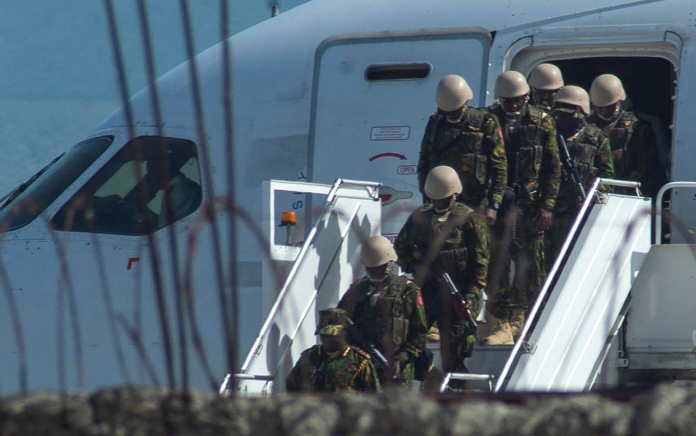In May, Kenyan President William Ruto visited the White House. It was the first official visit by a Sub-Saharan African leader in 15 years, and America did not disappoint. Celebrities like LeVar Burton and Danai Gurira of ‘Black Panther’ walked the red carpet, and former President Barack Obama, the American son of a Kenyan father, turned out for the festivities.
It was not all pomp and circumstance, however. Presidents Biden and Ruto discussed serious matters, including the United States naming Kenya a non-NATO ally, a first for an African nation. The most urgent matter, however, was the ongoing crisis in Haiti, where Kenya is set to lead a security force of 2,500 to help restore order.
Haiti has been living in chaos. President Jovenel Moïse was killed by a hit squad in 2021. Since then, approximately 200 gangs, armed by a “river” of guns from the United States, have terrorized the small nation. As a result, hundreds have been murdered and nearly half a million have fled their homes. Meanwhile, more than half the population (including 3 million children) is experiencing food emergencies, and 1.4 million are on the verge of famine.
Kenyan security forces arrive at Toussaint Louverture International Airport in Port-au-Prince on June 25. Kenyan security forces arrive at Toussaint Louverture International Airport in Port-au-Prince on June 25. CLARENS SIFFROY/AFP via Getty Images
Prime Minister Ariel Henri resigned in April, and a provisional council has appointed experienced U.N. development specialist Garry Conille as interim prime minister.
Yet for as much as Haitians have acted on their own to calm the situation and reestablish order, they still need help. That’s where the new peacekeeping operation spearheaded by Kenya comes in. The 1,000 Kenyan troops, accompanied by 1,500 additional volunteers from other countries, have a daunting task ahead of them, and it’s up to us to assist.
Thankfully, with other nations already committing personnel to Haiti, the United States can actively support this effort without putting U.S. boots on the ground. And that is exactly what the White House has already done by pledging $300 million to the international peacekeeping force Kenya will lead.
In addition to funding, the most important thing the United States can contribute is logistical support. While Kenyan forces were supposed to arrive in Haiti by the time their president arrived at the White House, problems on the ground in Port-au-Prince have delayed their arrival until mid-June.
The reason for the delay was the state of affairs in and around Port-au-Prince. Even in the nation’s capital city, there is a lack of critical infrastructure needed to host ships and aircraft from supporting nations. Kenya, while it has generously volunteered personnel, does not have all the equipment and vehicles they will need in order to operate effectively in this crisis situation. Medevac helicopters, necessary to perform evacuations of injured personnel and civilians, are in short supply. And that’s before looking at the intangible communications challenge: Kenyans speak English, while Haitians speak Creole and in some cases, French—and the country’s transitional government has yet to communicate with the public on how they will effectively address that barrier.
With our expertise, our proximity, and our sheer size as a military and logistical power, the United States can set up the Kenyan-led mission for success. By pledging financial support to the international peacekeeping mission, the White House has already shown that the willpower is there. What we do next as a nation will be critical.
We must ensure that Kenya and the police officers under their command are properly resourced. This means sending the arms, munitions, and other various equipment and supplies they need to succeed to do this, Congress must pass a waiver to the Leahy Laws and allow U.S. surplus to flow to Haiti.
We must also assist with logistics whenever possible to guarantee that foreign law enforcement officers are able to arrive in Haiti safely and reduce the risk of any further delays. This we can accomplish without dedicating law enforcement officers or combat troops by volunteering flights and expanding logistics at the port and airport in Port-au-Prince. After the infamous earthquake of 2010, the U.S. military was able to drastically increase Haiti’s capacity to accept foreign aid simply by providing logistical support at the airport. There’s no reason we can’t provide similar assistance today.
Kenya and others have already offered the people and training necessary to restore order on the streets of Haiti. Let’s now provide them the materials and support they need to complete their mission.
LTG. Russel L. Honoré (Ret.) is a former U.S. Army commander who led Task Force Katrina following the devastation of New Orleans. In 2022, he mediated The Haiti Unity Summit at the Southern University Law Center following the assassination of President Jovenel Moïse.
The views expressed in this article are the writer’s own.



